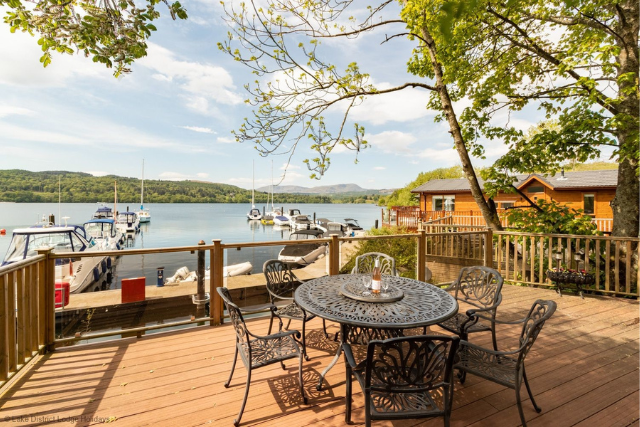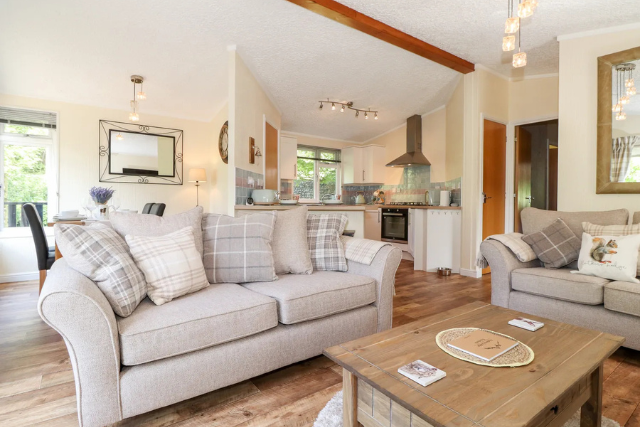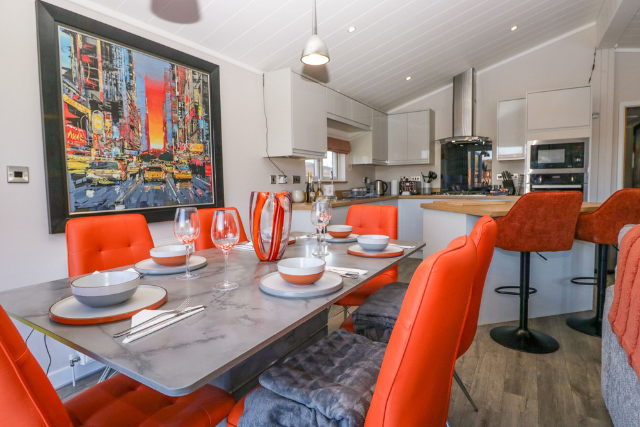Owning a holiday lodge offers you the chance to enjoy getaways with family and friends, in addition to letting the property out to guests to build an income.
**Please note: From 6th April 2025 the government has ceased the tax advantages that current furnished holiday let landlords have received. However, properties that qualified as FHLs in the 2024-25 tax year will still benefit from the previous rules regarding their tax return for that year.
Lake District Lodge Holidays has compiled some useful information regarding the old and new tax rules, plus links to official websites for lodge owners to be aware of.
Click here for full GOV.UK details about the Abolition of the furnished holiday lettings tax regime.

Waterbird, White Cross Bay near Windermere Ref. 1068862
What qualifies as a Furnished Holiday Let?
Before 6th April 2025 (1st April 2025 for limited companies), a property could qualify as a Furnished Holiday Let if it met the following criteria:
- Must be in the UK or the European Economic Area (EEA).
- Furnished to a sufficient standard. There are no set rules you need to follow in relation to furniture quantity, however you must include everything required to comfortably stay in a self-catering property. Guests must be entitled to the use of all furniture.
- The property must be commercially let with the intent to make a profit.
- Available to be let for at least 210 days (30 weeks) of the year – 105 of which must be commercially let to paying guests. (If you use the property yourself or allow family/friends stay at a discounted rate, this does not count towards the total occupation requirements).
** A property will stop being a Furnished Holiday Let if it is either sold, or used for private occupation.
To qualify as a Furnished Holiday Let (FHL) in the final year of the tax regime, your property needs to have been available for rental before April 6, 2025 (or April 1, 2025, if it’s a limited company). Additionally, you must meet the FHL qualifying criteria within the 12 months from when your property first became available to let.
For instance, if you list your property for letting on March 10, 2025, you can still qualify as an FHL for the 2024/25 tax year as long as you satisfy the FHL requirements by March 9, 2026.
The primary advantage of qualifying as an FHL in 2024/25 is that you’ll be able to claim capital allowances on your setup costs, and you might also be eligible for deductions on expenses related to purchasing, building, refurbishing, or converting your property into a holiday let.
For more information about the requirements for a FHL, take a look at the HS253 Helpsheet.

Nutkins Lodge, Limefitt Park near Windermere Ref. 1137012
What were the tax benefits of operating a Furnished Holiday Let?
As of April 2025, the tax benefits previously available to owners of Furnished Holiday Lets ceased. After this date, the regulations have shifted, removing the opportunity to claim these advantages. However, those benefits still apply to properties that qualified as FHLs during the 2024-25 tax year, as mentioned earlier.
Holiday Let Tax Deductible Expenses
If your property qualifies as a Furnished Holiday Let (FHL) during the 2024/25 tax year, you can claim capital allowances—a valuable tax relief available only to holiday lets (not long-term rentals). These allowances apply to qualifying assets such as furniture, furnishings, appliances, and certain fixtures (e.g. heating systems, plumbing, wiring).
However, from 6 April 2025 (1 April for companies), capital allowances will no longer be available for new purchases in FHLs. Instead, tax relief will only be available through the Replacement of Domestic Items Relief, which applies when replacing existing household items—but not for new acquisitions or improvements.
While general refurbishment costs are not usually eligible, specific integral features may qualify under pre-April 2025 rules if properly assessed.
By claiming capital allowances before the regime ends, you can significantly reduce your taxable profits from your holiday let, boosting your overall return on investment.
If you’re curious about whether your property qualifies, reach out to the team at Zeal for assistance.
For more details on capital allowances, please refer to the HS252 Helpsheet
Got a tax question? Zeal have a free helpline for Sykes and sister brand owners, get in touch via Sykes@gozeal.co.uk, and as a Sykes and brand owner, you have the benefit of exclusive 10% discount on standard fees.
Contribute to your pension in a way that offers tax benefits
Make sure to maximise your tax-advantaged contributions to your pension. The income you earn from a FHL property qualifies as ‘relevant earnings,’ enabling you to take advantage of these valuable pension contributions.
For further details, please refer to the HS253 Helpsheet.
If you sell your property
If you recently sold your FHL (Furnished Holiday Let) property, you could take advantage of specific Capital Gains Tax (CGT) reliefs that aren’t available for long-term rental properties. These include:
- Business Asset Disposal Relief
- Business Asset Rollover Relief
- Gift Hold-over Relief
Distribute profits among joint owners to optimise tax benefits
If you shared your FHL, you had the opportunity to distribute profits more flexibly among the legal owners for tax benefits. In contrast to long-term rental properties, where profits are divided strictly by ownership percentages (for example, a 50% ownership means a 50% share of the profits), FHL properties allow you to decide how to allocate profits. However, this flexibility has changed, and these properties are now treated like long-term rentals.
For more information, see this Trusts, Settlements and Estates Manual.
**April 2025 Changes to Furnished Holiday Let Taxes**
Following the Budget announcement on March 6, 2025, significant alterations have been made to the Furnished Holiday Let tax regime. Effective from April 2025, this regime has been eliminated, despite considerable lobbying from our sister company, Sykes Holiday Cottages and the Professional Association of Self Caterers (PASC).
Beginning April 6, 2025 (or April 1, 2025, for companies), the income and profits generated from Furnished Holiday Lets will now be classified as part of the owner’s property business. This means they will be subject to the same tax rules as long-term lets. Here are some important changes to keep in mind:
- Interest on finance costs, like mortgage interest, is now capped at the basic Income Tax rate. Additionally, you can no longer claim capital allowances for qualifying expenditures.
- For Furnished Holiday Lets, the ‘replacement of domestic items relief’ still applies, aligning it with other property businesses.
- Unfortunately, Capital Gains Tax relief options—such as Business Asset Disposal Relief, Rollover Relief, and Gift/Holdover Relief—are no longer available.
- Income generated from Furnished Holiday Lets will no longer count as relevant UK earnings when figuring out the maximum tax relief on personal pension contributions.
- The sections for ‘FHL’ and ‘UK Property’ on your tax return will now be merged.
- All UK property income and expenses must be reported together, with tax calculated based on the net profit from all lets combined. However, the method for calculating profits from holiday lets remains unchanged.
- Lastly, the higher rate for Capital Gains Tax has decreased from 28% to 24% and for basic rate taxpayers 18%

Coniston View Lodge, near Carnforth Ref. 1173819
Furnished Holiday Let Allowable Expenses:
While capital allowances will no longer be available for new purchases starting in April 2025, holiday let owners can still benefit from claiming for the replacement of certain items under the ‘Replacement of Domestic Items Relief.’ This relief covers domestic items, which may include:
- Moveable furniture (sofas, tables, bed frames)
- Furnishings (carpets, rugs)
- Household appliances (fridges, freezers, washing machines)
- Kitchenware (crockery, utensils, cutlery)
For more detailed information about Furnished Holiday Let Tax Guide, please click here to view our sister brand blog page from Sykes Holiday Cottages
What are Furnished Holiday Lettings allowable expenses?
When managing the expenses for your FHL property, think of it like running a business. This approach allows you to offset your business-related expenses against your income. Here are two important things to note:
First, make sure that the expenses you claim are solely for commercial use. If you, your family, or your friends make use of the property, a portion of those expenses will be classified as ‘private use.’ Thus, you will need to determine the percentage of the expense that qualifies as commercial.
For instance, if you occupy the property for personal use for three months out of the year, only 75% of those expenses can be counted toward commercial use.
Secondly, your expenses cannot be capital in nature. This means that any one-time payments for purchasing or building the property, or for its fixtures, aren’t eligible for claims (capital allowances can address these costs).
Here are some examples of allowable expenses:
- Marketing/advertising; website setup, advertisements in brochures, newspapers etc.
- Council Tax
- Water rates
- Gas, electricity, coal etc.
- Cleaning and laundry; washing up liquid, toilet rolls, laundry services etc.
- Telephone; phone calls regarding holiday letting etc.
- Repairs and Renewals; this includes expenses incurred during general maintenance and upkeep such as painting and decorating
- Insurance; building, contents, public liability etc.
- Interest on a loan to purchase or improve your furnished holiday let. Note, only the interest element of the mortgage payments can be offset, not capital repayments (subject to the restriction on finance costs under the new rules)
- Letting agents’ fees
- Accounting fees; it will cost to get an accountant prepare your tax return to declare your furnished holiday let income and expenditure
- Traveling expenses; you are able to claim mileage at the fixed mileage rate to and from the property, as long as it relates purely to running the FHL and is not combined with private travel and is recorded in a mileage log
If your holiday rental is privately used for a portion of the year, you should allocate your expenses fairly between personal and business use..
Other holiday let tax considerations
Stamp Duty Land Tax (or equivalent)
In England and Northern Ireland, Stamp Duty Land Tax (SDLT) applies when you purchase a residential property or land. If you’re buying a second property—one that isn’t your main home—you’ll usually pay an additional 3% surcharge on top of the standard SDLT rates.
Until 31 March 2025, the standard SDLT threshold (the point at which SDLT begins) is £250,000 for residential properties. From 1 April 2025, this threshold will revert to £125,000.
However, for second homes and buy-to-let properties, the 3% surcharge applies from £40,000, meaning SDLT is due on most additional property purchases.
Stamp Duty is calculated on a tiered basis – you are taxed on the part of the property purchase price that falls into each Stamp Duty threshold.
Read our handy guide to Holiday Let Stamp Duty explained
What expenses can be considered tax deductible for holiday lets?
Allowable expenses can help with tax relief for qualifying Plant & Machinery (P&M) assets used in your business. This includes things like furniture, furnishings, equipment, and even hot tubs for holiday lets.
Starting from April 2025, holiday let owners won’t be able to claim capital allowances on new purchases. However, you can still take advantage of the ‘Replacement of Domestic Items Relief’ for certain items you replace. Eligible domestic items for this relief encompass:
- Household appliances (like fridges, freezers, washing machines)
- Moveable furniture (such as sofas, tables, bed frames)
- Furnishings (including curtains, rugs, carpets)
- Kitchenware (crockery, cutlery)
It’s important to note that for new holiday let properties after April 2025, capital allowances on the initial purchase of these assets won’t be available. Tax relief will only apply to replacements going forward.
More detailed information about Furnished Holiday Let Tax Guide, click here to view our sister brand blog page, Sykes holiday Cottages
Paying VAT on a Furnished Holiday Let
If your Furnished Holiday Let (FHL) generates income that exceeds the annual VAT threshold of £90,000, you will need to register for VAT. The current standard VAT rate is 20%. This threshold equates to about £7,500 in monthly turnover, which is typically challenging for most holiday lets to reach unless you own a larger home or a high-end luxury property. As a result, it’s likely that you’ll need to have more than one holiday let before VAT considerations come into play.
It can be difficult to understand VAT on holiday lets so it’s best to take advice from specialists like Zeal to make sure you get it right.
For more GOV.UK information about VAT on Holiday accommodation
For more advice:
Check out HMRC’s handy Guide on Furnished Holiday Lettings (2022)
We are here to help answer any of your questions or just guide you in the right direction when starting the holiday let journey, so give your local Lake District Lodge Holidays team a call on 01539 761514 or request your FREE owner pack here
Disclaimer
The advice above is given by Zeal. Lake District Lodge Holidays can’t advise you on, and isn’t responsible for, tax matters in relation to your holiday let and the above should not be taken as such, rather as a prompt of the issues involved for further consideration. As always, please read the relevant laws, regulations and guidance and seek advice from external experts where you require it. Lake District Lodge Holidays hopes that by pointing you in the direction of an expert in the field, it’s starting you off on the right foot, and you can read into this matter further and seek your own advice from Zeal, or your chosen advisor, as and when you feel it’s needed. We cannot make any representations or warranties of any kind as to the competency, qualification, fitness for purpose, accuracy, reliability, suitability, or availability of Zeal’s offers, products or services. If you choose to enter into any arrangement for the supply of goods or services of a supplier listed in this newsletter or links, you do so entirely at your own risk. Any such arrangement is between you and the supplier. We are not a party to it. We shall not be liable for any loss or damage arising under or in connection with any such arrangement or any action or decisions you take or do not take as a result of reading the above or any loss suffered as a result.